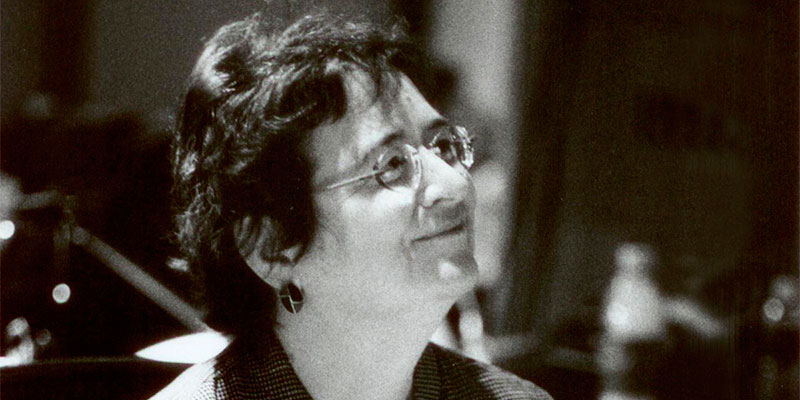By Joan Amenn
What do Hans Zimmer and Danny Elfman have in common besides creative genius and widespread popularity? They were either mentored or collaborated with an overlooked heroine of female representation in film, composer Shirley Walker. She is perhaps best known for creating the theme for the horror film series, “Final Destination” but achieved so much more. She truly deserves greater appreciation and recognition for her leadership as a woman in a field dominated by men as well as for her prolific body of work.
Walker was so gifted as a pianist that she played with the San Francisco Symphony while still a teenager. Not content to be just an accompanist, she branched out into conducting and composing. It cannot be stressed enough how radical and trailblazing her ambition was for a woman in the 1960’s. Even today, women conductors are rare and women composers equally, if not more so. Her first screen credit came when her skills with a keyboard landed her a job playing with Carmine Coppola in “Apocalypse Now” (1979).
“[Shirley Walker] truly deserves greater appreciation and recognition for her leadership as a woman in a field dominated by men as well as for her prolific body of work.”

From there it seemed like she was an unstoppable train charging through project after project. When Tim Burton’s “Batman” (1989) acquired Danny Elfman to do the score, their mutual agent brought him and Walker together and the rest was music history. She conducted for the film which led to her being hired to collaborate with Elfman again for “Edward Scissorhands” (1990).
But Walker seemed to have a fondness for DC Comics and when Bruce Timm adapted Batman from the big screen to television in “Batman: The Animated Series”, she was brought in to continue to expand on the film’s original score. The highlight of this was a theme that came to be associated with Mark Hamill’s Joker. It sounds like it could be played on a travelling carnival’s merry-go-round but there is an unmistakable edge to the melody that perfectly matches the character’s sociopathic tendencies.
“Walker was so gifted as a pianist that she played with the San Francisco Symphony while still a teenager. Not content to be just an accompanist, she branched out into conducting and composing. It cannot be stressed enough how radical and trailblazing her ambition was for a woman in the 1960’s.”
From there, Walker scored “Batman: Mask of the Phantasm” (1993) which as a major motion picture based on the animated series. Many other composers might have dismissed Batman as just a cartoon, but the truth is it was as innovative and pioneering as Walker herself. In “Phantasm” there is a particular score for a scene where Bruce Wayne visits a World Fair that is beautifully uplifting as promising innovations of the future are revealed to him. It’s an amazingly hopeful respite from an otherwise dark tale of revenge and loss.

Director Bruce Timm has mentioned that Hans Zimmer sat in uncredited on the recording of the opening theme of “Phantasm” to help out his old friend and mentor. Walker has gone on record as saying “Phantasm” was her favourite project of all the many she worked on. In 1996, Bruce Timm and DC Comics launched “Superman: The Animated Series” and of course, Walker was on board to assist in composing. It should be noted that in adapting “Superman” for television, John Williams’ score was not used. It must have been daunting to take on creating new music after such an iconic piece was already associated with the character, but she rose to the occasion.
Walker won the Daytime Emmy for Music Direction and Composition in 1996 for “Batman: The Animated Series. She would be nominated for “Superman: The Animated Series” in 1998 and go on to win another Daytime Emmy in 2001 for another DC Comics series, “Batman Beyond.”
“Shirley Walker is still an unsung, overlooked creative giant who should receive more public recognition as a champion for diversity in the film industry as well as for her music.”
Besides all of her work in television, Walker is recognized for her film score for the horror film “Final Destination” (2000). In it and the subsequent sequels, Walker creates the perfect horror theme of ominous bass and threatening violin. One would think all of her screen credit more than enough for one career, but she also became involved in the music community through numerous professional organizations such as the Society of Composers and Lyricists (SCL) where she served first as a Board Member and then as Vice President from 1988-1992.

Walker was working up to the time of her tragically sudden death from a stroke in 2006. In recognition of her pioneering representation of women in the field of music in television and film, the American Society of Composers, Authors and Publishers (ASCAP) created the Shirley Walker Award in 2014. The first recipients of this award were composing team Lisa Coleman and Wendy Melvoin who are better known as Wendy & Lisa from their early days accompanying Prince.
Shirley Walker is still an unsung, overlooked creative giant who should receive more public recognition as a champion for diversity in the film industry as well as for her music.


7 thoughts on “Retrospective: The Musical Legacy of Shirley Walker”